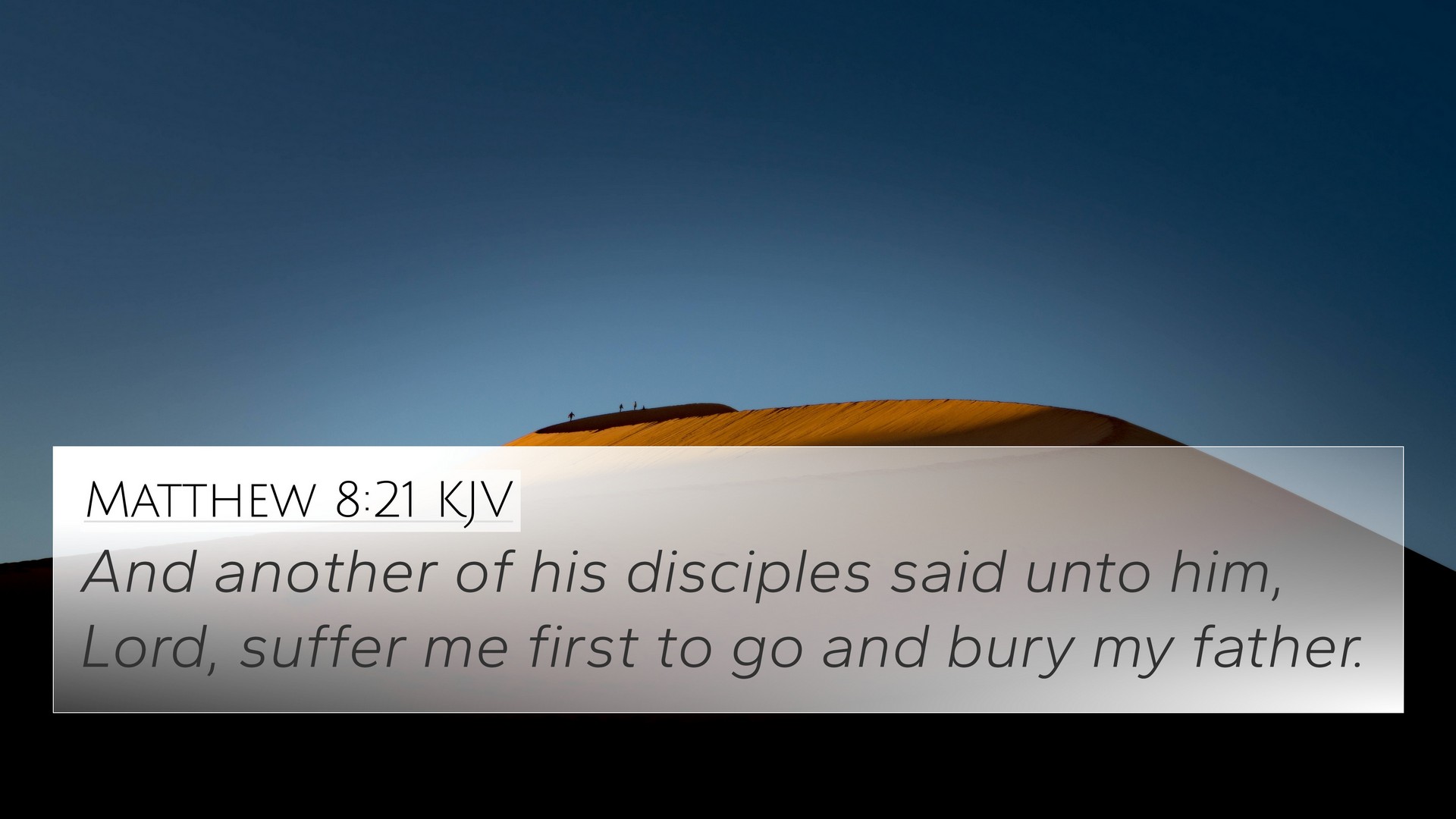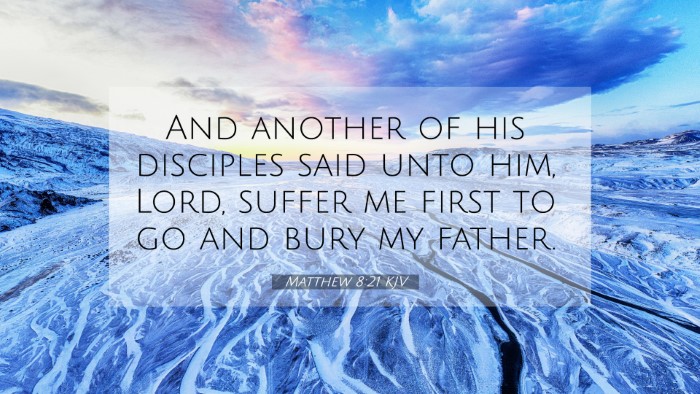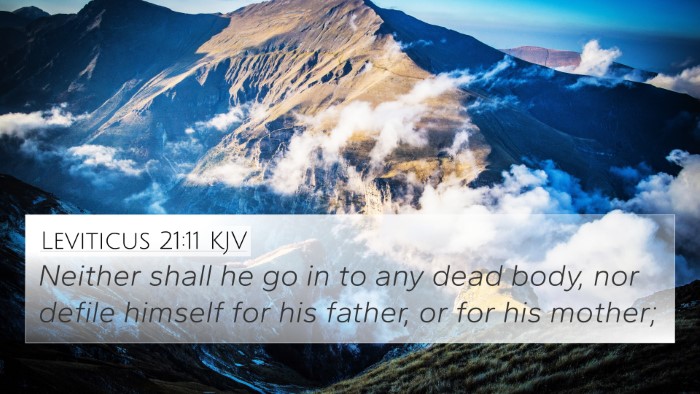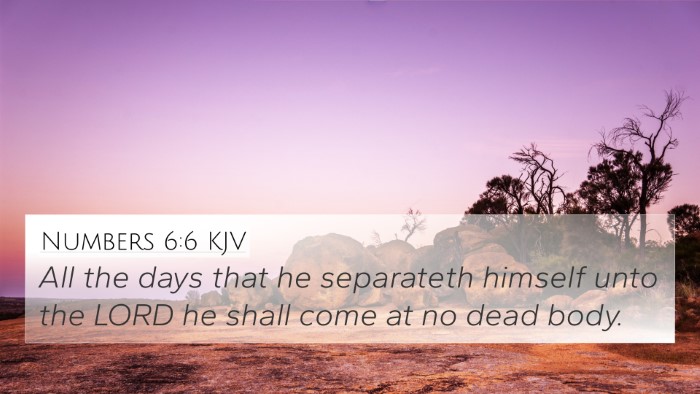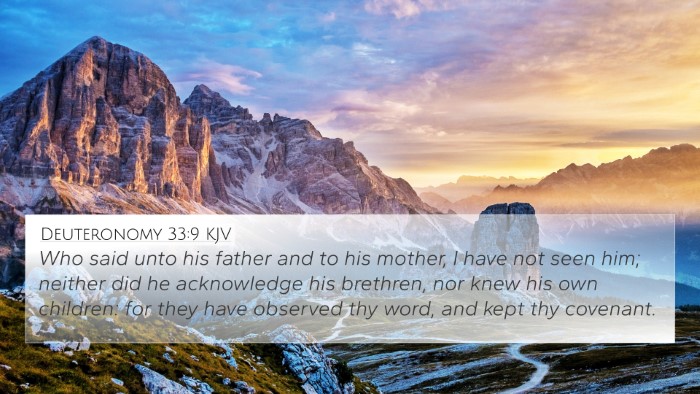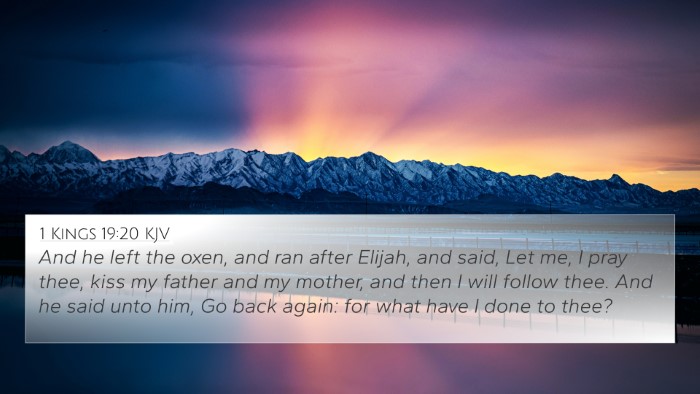Understanding Matthew 8:21
Verse: Matthew 8:21 - "And another of his disciples said unto him, Lord, suffer me first to go and bury my father."
Summary of Meaning
Matthew 8:21 presents a poignant moment where a disciple expresses a desire to attend to familial obligations before following Jesus. This scenario highlights the conflict between earthly responsibilities and the call to discipleship. The insightful analysis from various public domain commentaries reveals several layers of meaning in this interaction.
Insights from Commentaries
-
Matthew Henry:
Henry emphasizes the immediate and demanding nature of the call to discipleship. He suggests that the disciple's request reflects a common human tendency to prioritize worldly concerns, even when faced with divine authority. Henry reminds us that the call of Christ requires urgent response, often at the expense of temporal matters.
-
Albert Barnes:
Barnes elaborates on the implications of the phrase "suffer me first." He indicates that the disciple might have been looking for a delay, which could demonstrate a lack of commitment. Barnes underscores that discipleship requires precedence over all other commitments, signaling the radical dedication demanded of Christ's followers.
-
Adam Clarke:
Clarke notes that the mention of burying one's father reflects deep emotional ties and cultural expectations of the time. He suggests that Jesus's response is a call to prioritize spiritual matters over social and familial traditions, reinforcing the notion that following Christ sometimes necessitates profound sacrifice.
Key Themes and Context
The interplay of urgency and commitment in Matthew 8:21 serves as a reminder of the radical nature of discipleship in the New Testament:
- Urgency of the Gospel: The passage calls attention to the immediacy with which one should respond to Christ's call, echoing similar themes found in Luke 9:59-60 where Jesus addresses the same issue of worldly distractions.
- Priorities in Following Christ: The prioritization of spiritual duties over worldly ones is consistent with Luke 14:26, where Jesus warns that one must love Him more than one's own family to be His disciple.
- Discipleship and Sacrifice: This theme is prevalent throughout the Gospels, notably in Matthew 16:24, where Jesus states that followers must deny themselves and take up their cross.
Bible Cross-References
To deepen our understanding of Matthew 8:21, consider these related scriptures that illuminate the themes of discipleship:
- Luke 9:61-62 - Another disciple expresses a similar desire, leading to Jesus' call for unwavering commitment.
- Matthew 10:37 - Stressing the need to place Jesus above all other relationships.
- 1 John 2:15 - A warning against loving the world and its attachments which can distract from spiritual pursuits.
- Philippians 3:8 - Paul speaks to considering everything as loss compared to knowing Christ.
- Matthew 19:29 - The promise of rewards in the Kingdom for those who leave familial ties for the sake of Jesus.
- John 12:25 - The principle that one must lose their life to find it in Christ.
- Luke 14:33 - Jesus concludes that anyone who does not renounce all cannot be His disciple.
- Acts 2:44-45 - The early disciples shared everything in community, illustrating commitment to each other and to Christ.
- Romans 12:1 - The call to present our bodies as living sacrifices aligns with the call to follow Christ above all.
Thematic Connections
This verse connects with broader themes within the Bible, creating a rich tapestry of scripture that addresses:
- The Cost of Discipleship: Numerous verses challenge believers to weigh their commitments critically against their call.
- Familial Relationships: The complexities of family dynamics in relationship to spiritual allegiance are illustrated in various Biblical narratives.
- Urgency of the Gospel Mission: The Bible consistently emphasizes the need for prompt action in following God's call, adding importance to Matthew's narrative.
Conclusion
Matthew 8:21 serves as a compelling reminder that the call to follow Jesus transcends ordinary circumstances and obligations. Through examining insights from established commentaries, we uncover a deeper understanding of the necessity for prioritizing spiritual over temporal matters. As believers delve into Bible verse cross-references and the rich connections between Bible verses, they are encouraged to reflect on their own commitments and the transformative demands of discipleship.
